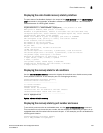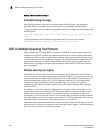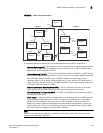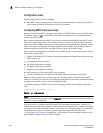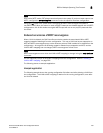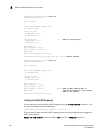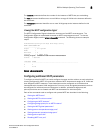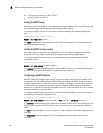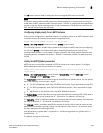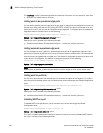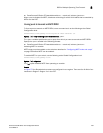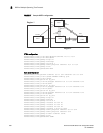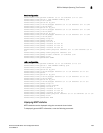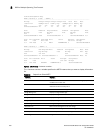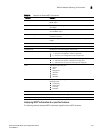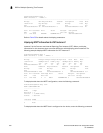
PowerConnect B-Series FCX Configuration Guide 295
53-1002266-01
802.1s Multiple Spanning Tree Protocol
8
The no option moves a VLAN or VLAN group from its assigned MSTI back into the CIST.
NOTE
The system does not allow an MSTI without any VLANs mapped to it. Consequently, removing all
VLANs from an MSTI, deletes the MSTI from the system. The CIST by contrast will exist regardless of
whether or not any VLANs are assigned to it or not. Consequently, if all VLANs are moved out of a
CIST, the CIST will still exist and functional.
Configuring bridge priority for an MSTP instance
Priority can be configured for a specified instance. To configure priority for an MSTP instance, use a
command such as the following at the Global Configuration level.
PowerConnect(config)#mstp instance 1 priority 8192
Syntax: [no] mstp instance <instance-number> priority <priority-value>
The <instance-number> variable is the number for the instance of MSTP that you are configuring.
You can set a priority to the instance that gives it forwarding preference over lower priority
instances within a VLAN or on the switch. A higher number for the priority variable means a lower
forwarding priority. Acceptable values are 0 - 61440 in increments of 4096. The default value is
32768.
Setting the MSTP global parameters
MSTP has many of the options available in RSTP as well as some unique options. To configure
MSTP Global parameters for all instances on a switch.
PowerConnect(config)#mstp force-version 0 forward-delay 10 hello-time 4 max-age
12 max-hops 9
Syntax: [no] mstp force-version <mode-number> forward-delay <value> hello-time <value>
max-age <value> max-hops <value>
The force-version parameter forces the bridge to send BPDUs in a specific format. You can specify
one of the following <mode-number> values:
• 0 – The STP compatibility mode. Only STP BPDUs will be sent. This is equivalent to single STP.
• 2 – The RSTP compatibility mode. Only RSTP BPDUS will be sent. This is equivalent to single
STP.
• 3 – MSTP mode. In this default mode, only MSTP BPDUS will be sent.
The forward-delay <value> specifies how long a port waits before it forwards an RST BPDU after a
topology change. This can be a value from 4 – 30 seconds. The default is 15 seconds.
The hello-time <value> parameter specifies the interval between two hello packets. The parameter
can have a value from 1 – 10 seconds. The default is 2 seconds.
The max-age <value> parameter specifies the amount of time the device waits to receive a hello
packet before it initiates a topology change. You can specify a value from 6 – 40 seconds, where
the value adheres to the following formula.
max age equal to or greater than 2 x (hello-time + 1) AND max age equal to or greater than 2 x
(forward-delay – 1)
The default max-age is 20 seconds.



